Meeting set to decide Goulburn’s future
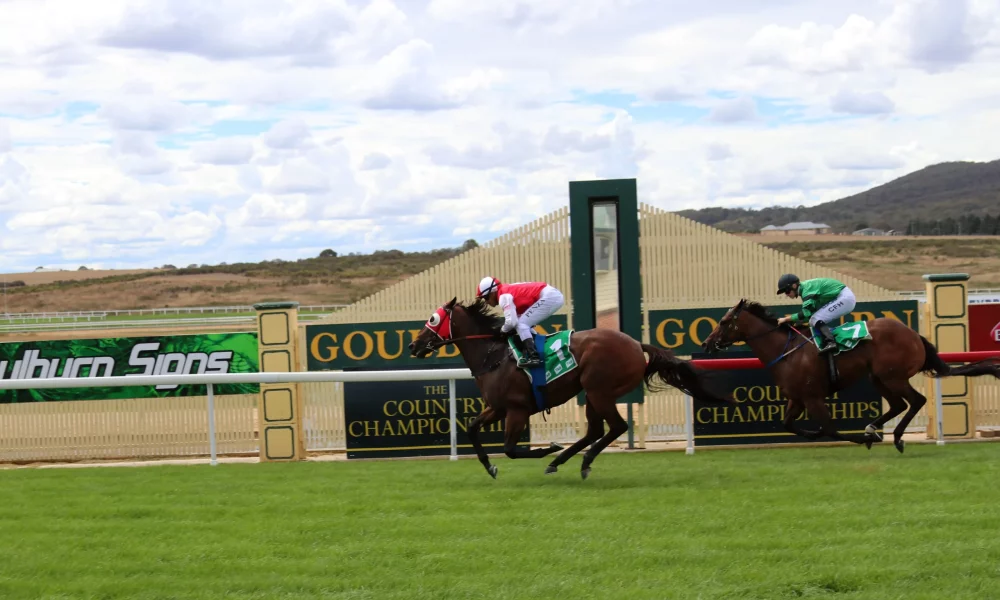
On the Goulburn Race Club website it says its freehold racecourse and facilities allows it to be “in charge of its own destiny and has no constraints”.
The relocation of the Goulburn racecourse, from Braidwood Road to Taralga Road, was funded in the mid-1990s by the then Fahey state Liberal government and the new course opened in 1999.
But now, 25 years on, it appears that the club could be about to give away its independence to Racing NSW.
An information meeting between the board and its members is set to be held on Monday to discuss the merits of the recently announced $9.5 million in funding from the state’s thoroughbred governing body to build an extra 80 boxes and associated training infrastructure at Goulburn.
The big announcement, amongst a raft of state-wide infrastructure projects slated for Albury in the south to Ballina in the north, was made on February 29, the day after Dr Saranne Cooke was confirmed as Racing NSW’s new chair and former Labor racing minister Kevin Greene was returned for a second term on the Racing NSW board.
Almost immediately, however, it became apparent that there was a catch with the promised funding for the stabling complex at Goulburn on the 40-hectare site. It is understood that the Goulburn Race Club will have to forfeit ownership of the valuable parcel of land on which the racecourse sits and instead transfer it to Racing NSW in order to secure the funding.
One critic of the proposal, spoken to by this column about the issue but who wished to remain anonymous, said: “I am totally against [this plan] because, A, that ground out there on market value for land around Goulburn today would be worth a lot more than the $9.5 million and, B, isn’t it Racing NSW’s charter to fund these infrastructure projects anyway?”
The opponent suggested that Goulburn Race Club should instead borrow the money and build the stables themselves – thus retaining ownership of the land – as it did when Ken Callaughan moved there from Capricorn Park two decades ago.
If constructed, the boxes would be filled immediately by trainers such as Matt Dale and Pat Murphy, let alone any other trainers wishing to move to the area.
Monday’s information session will precede a members’ vote planned for April 2 with many of the details surrounding Racing NSW’s potential “purchase” of the racecourse unclear.
Goulburn Race Club’s long-serving CEO Robyn Fife did not return this column’s calls on Thursday.
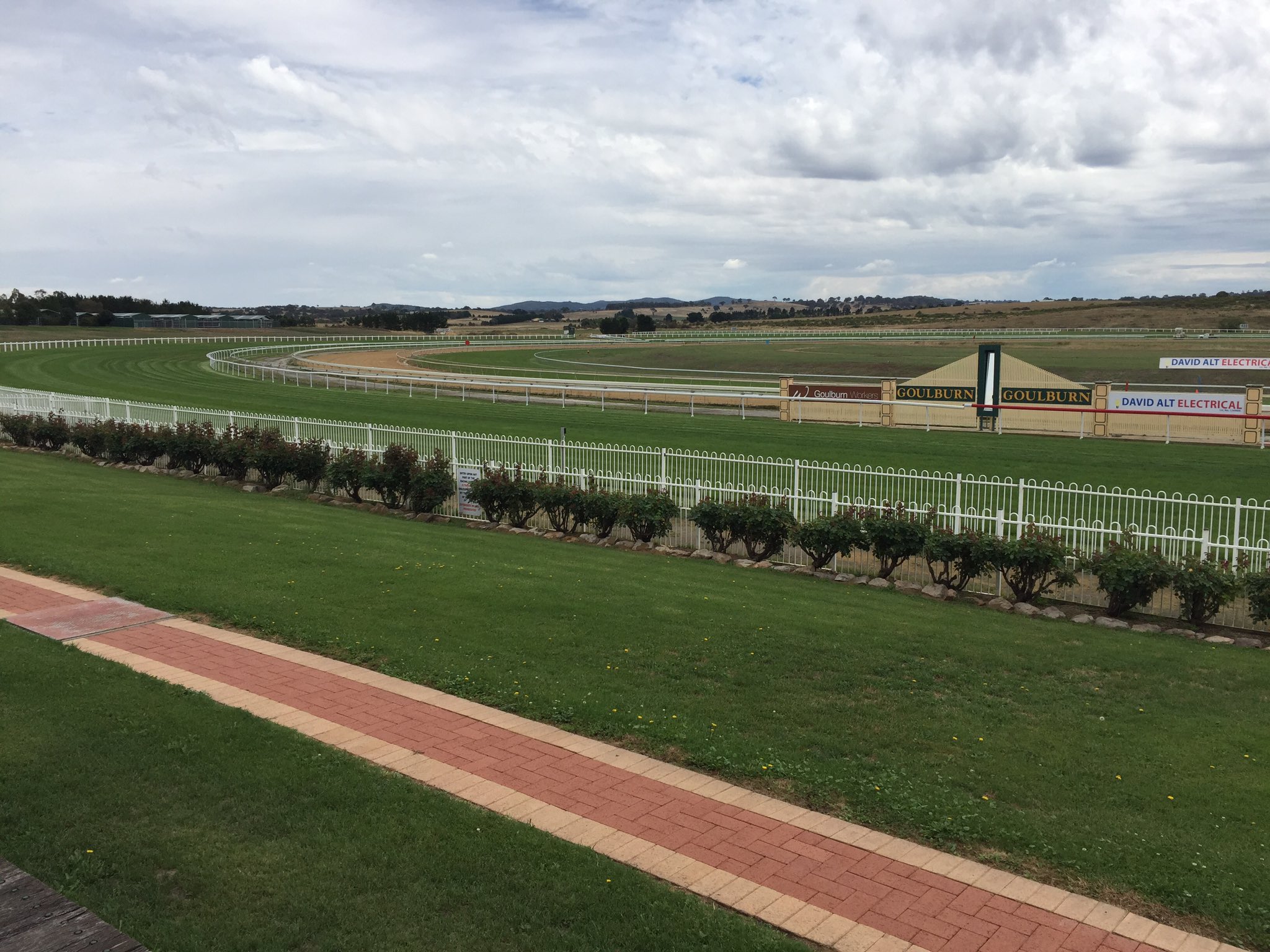
***
One of the most important figures in the Australian thoroughbred business for more than a decade has closed the cheque book and logged off from peering at spreadsheets and balance sheets for the final time.
Magic Millions’ chief financial officer Stu Aikman – the man who says yay or nay to a line of credit for any potential buyer – officially signed off on Tuesday night after the completion of the company’s March Yearling Sale on the Gold Coast.
Aikman, and his Inglis counterpart Andrew Munce, is integral to ensuring the thoroughbred economy continues to tick, providing the financial liquidity to allow breeders, owners, trainers and speculators to buy at sales across Australia and New Zealand.
He has played a key role in the extraordinary success of Magic Millions since arriving at the company in 2011, four weeks after then managing director Vin Cox took charge of the Gerry Harvey and Katie Page-Harvey owned auction house.
The decision to retire wasn’t an easy one, with Aikman stepping aside to care for his wife Cath who has been suffering from ill health.
Aikman looks back on his time with Magic Millions, which turned over $154 million in his first year as CFO before climbing to staggering heights above $500 million during the pandemic and $450 million in 2023, with fond memories.
“We meet everyone from billionaires to bankrupts, which is amusing. I guess the businesspeople who have business brains don’t always bring it into the sales arena, which has been quite interesting [to witness],” Aikman said on Thursday.
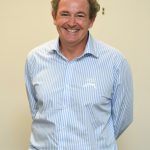
“In a business environment a decision is made whereas sometimes there’s an ego decision on how much they’re going to pay for a horse. I think the rules of business don’t necessarily apply to bidding on a horse.”
During Aikman’s long tenure, Magic Millions has become more than just a thoroughbred auction house. The Gold Coast January sale and its Magic Millions race days, in particular, are now considered a mainstream tourist attraction and receive government funding as a result.
“When we first started, Vin began about a month before I did, the direction from Katie was, ‘it’s no longer a hobby, it’s a business’ and that was an important rule to adhere to, so the giving out of credit started to become tighter,” Aikman says.
“It wasn’t just word of mouth, there was a bit of research, data, reference checking and things like that undertaken. Just giving credit out on face value stopped and discussions were had with people.
“Talking to people face to face was the best measure that I found [of their suitability for credit]. Asking questions and seeing what their responses were, seeing whether they seemed committed to their answers or whether their answers were full of holes.”
Sam Roberts, who has been with Magic Millions for about five years, has been appointed as Aikman’s successor as CFO.
Maybe Sam will give those who inhabit the press room a line of credit. His predecessor certainly didn’t!
***
Near the NSW-Victoria border, the small agricultural town of Berrigan on Saturday will host its annual Finley Autumn Cup non-TAB race meeting.
It was that racecourse – which races in the anti-clockwise “Victorian” direction, but is located in NSW – that Emma Scott trained the last of her 68 runners. That was five years ago this weekend.
Scott, 38, hails from another even more western NSW town in Balranald – almost five hours’ drive from Melbourne, 529 kilometres from Adelaide and almost nine hours’ drive from Sydney. She also happens to have been the one who bought Monday’s Adelaide Cup (Gr 2, 3200m) winner Excelleration (Excelebration) for a paltry $6,000 from the Riverina Downs draft at the 2018 Magic Millions Adelaide Yearling Sale.
Scott wasn’t the trainer on Monday, nor was she when Excelleration won the preceding Launceston Cup (Gr 3, 2400m) or the $50,000 Great Western Cup (1950m) prior to that. In fact, she never saddled him up in a race.
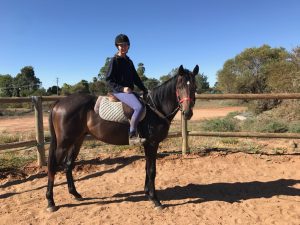
That honour and subsequent Group race spoils rests with Ballarat-based former jumps jockey-turned-trainer, Irishman Richard Cully.
But the now Toowoomba-based Scott, who works part-time in administration at the University of Southern Queensland while also being an accredited Queensland Off-The-Track acknowledge retrainer, did receive a host of calls and messages from friends congratulating her on her role in the Excelleration story, firstly buying him and then breaking him in.
Scott has her own interesting backstory, having made Australia’s shadow squad for the eventing team at the 2012 London Olympics, and when that dream ended and she had time to reflect on her achievements in the saddle, she decided to take out her trainer’s licence based out of her home town of Balranald.
“I trained a lot and I was aiming for the 2012 London Olympics. I made the shadow squad, so I was in the final ten people to get selected, but not actually in the team of six that went over for it,” Scott tells Rowe-View.
“When that wound up I decided to go training [racehorses] for a few years just in the country and in country racing.”
Her parents grew up on stations in far western NSW but they moved to Balranald when Scott was young and she says the area, which is close to the Yanga National Park and the World Heritage-listed Mungo National Park, was a great place to spend her early years.
“We had an acre block on the edge of town and in Balranald you can saddle up your horse after school and go riding all around the common and down at the river and that sort of thing,” she says.
“It was a great place to grow up and live that country lifestyle.”
As for the racehorse revelation that is Excelleration, Scott admits he was nothing flash to look at as a young horse, but that he did endear himself to her by demonstrating above average intelligence, a trait that has held him in good stead as an in-form staying seven-year-old. After his Adelaide Cup glory, the gelding’s record is seven wins and seven placings from 19 starts.
“He certainly wasn’t an eye-catcher in the parade ring as far as his physical development goes, but he just had something about him with his brain, he could just handle it and not get overwhelmed, that was his strength but physically he was lanky and immature and not quite up to it as a two-year-old,” Scott recalls.
“As far as his brain and mentality to handle the job, it’s always been there.”
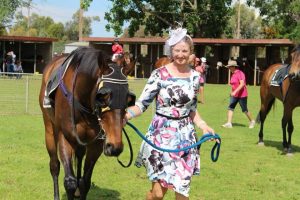
She adds: “We wouldn’t have been having this discussion a couple of months ago, the bar would have been set too high, but he’s shown up at every race and Richard has done a fantastic job preparing him, he’s going from strength to strength.
“[The Melbourne Cup is] getting mentioned now, which is exciting, and the journey keeps getting better and better, so let’s see how far it can go.”
Adding to the sentiment of the Adelaide Cup victory was the fact that he was ridden by Swan Hill-based jockey Harry Coffey, who hails from a popular racing family who Scott is close with.
Before handing in her licence, owing to the difficulties of accessing farriers, track riders and hay, Scott trained four winners during her brief three-year stint, her last victory coming when gelding Yell Out Loud (Keffelstein) scored on her home track on Victoria Derby Day 2018. He was also her last runner at the aforementioned Berrigan meeting.
When she retired from training, Excelleration was just a two-year-old as was her other $6,000 Adelaide purchase of 2018, a Husson (Hussonet) colt who won a Penola maiden for trainer Darryl Dodson.
And so, with the thrill of watching Excelleration’s exploits from afar, does Scott harbour any ambitions to return to the training ranks?
“Not at this stage of my life. I wouldn’t say I won’t do it again, I do enjoy it, but it’s probably not on the cards in the next few years,” she answered.
***
‘Swallow your pride’: A major Victorian race has lost appeal. This is what some think can fix it
That was the headline on the front of Victoria’s The Age website on Tuesday, leading the ‘editor’s picks’ stories.
It was referring to the All-Star Mile (1600m). The race, now worth $4 million instead of $5 million, never had anything to lose in the first place as it never had ‘it’ at all.
Sure, Mystic Journey was a great story – and a terrific result for Wayne Roser and trainer Adam Trinder – in year one, but the All-Star Mile has never been able to attract the stars.
Mr Brightside (Bullbars) will start a short-priced favourite on Saturday, aiming to win back-to-back All-Stars, but outside that it won’t capture any major interest.
Chris Waller has been a considered voice of reason on a number of industry issues in recent months – and his opinions have importantly transcended the racing industry and made their way into the mainstream – and the champion trainer once again made sense when asked about the predicament of the All-Star Mile, which struggled to attract a full field, let alone one with a multitude of stars.
Waller said Fangirl (Sebring) would most likely have been in the All-Star Mile had it been worth $10 million instead of $4 million.
“But I’m not asking for that,” Waller told SENTrack.
“Yes [$10 million] would get Fangirl there, but I don’t think it’s for the better of racing, so she’s sticking to her path that we’ve set out which will now be the George Ryder on to the Queen Elizabeth.”
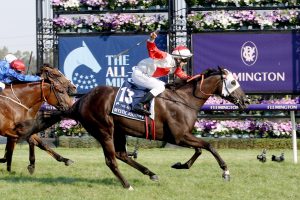
Mystic Journey, (Anthony Darmanin, trainer; Adam Trinder) wins the All Star Mile, at Flemington, 16 March, 2019. Copyright: Colin Bull / Sportpix.
The premise of The Age article was, it seems, clickbait. Get Racing NSW CEO Peter V’landys’ name in there and a “us versus them” Victoria-NSW debate and you have a story. Richard Irvine, who has done a lot of good advocating for punters’ best interests, has entered into the “dial-a-quote” space.
And journos all need a few go-tos for such scenarios, but Irvine was, I thought, up until now, above that. Sadly not.
The answer to Victoria’s preoccupation with competing with Sydney in the autumn isn’t the All-Star Mile. It’s staring them in the face – the Newmarket Handicap and the Australian Cup.
Two great races run at Flemington usually on dry and often fair tracks. Instead of spreading the audience and the equine talent pool over so many weeks, condense it, and avoid a clash with the football.
Make Newmarket-Australian Cup day one great meeting. The current RV administration of CEO Andrew Jones and Matt Welsh can abandon the All-Star Mile they inherited from the Giles Thompson-Greg Carpenter regime.
Dare I say it, the Australian Cup-Newmarket meeting could and should be Victoria’s “Everest” crowd puller.




